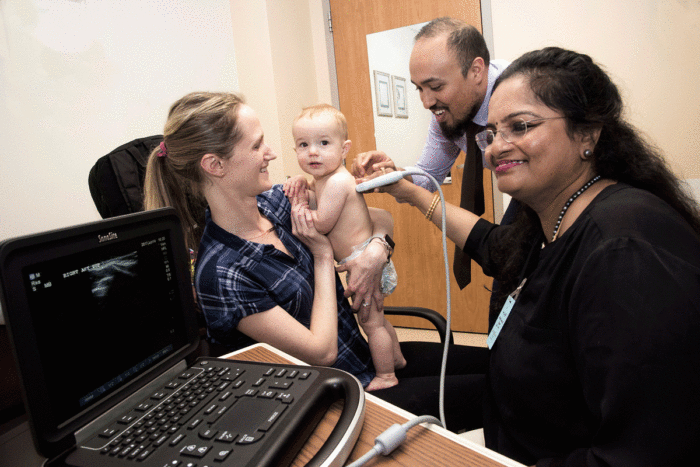Ultrasound trainees visit Medical Campus as part of international study
Trial will evaluate if clean-fuel stoves can reduce household pollution
 Robert Boston
Robert BostonIn a Washington University School of Medicine exam room, study volunteer Catherine Miele (left) holds her son Robert as K. Vadivu, MD (right), a visiting obstetrician/gynecologist from India, practices scanning techniques. She is helped by Farhan Pervaiz, MD, a fellow at Johns Hopkins University School of Medicine. Vadivu and 16 other trainees visited the Medical Campus to learn scanning techniques for an international study that will evaluate if clean-fuel stoves can reduce household air pollution.
Rural households in developing countries often rely on coal and biomass fuels such as wood, crop residues and animal dung to cook and heat homes. The smoke from this type of cooking has been linked to lung disease in children, cardiovascular disease in adults and, in babies, low birth weights.
According to the World Health Organization, more than 3 billion people worldwide use biomass fuels for cooking and/or heating their homes, and more than 4 million people die annually from illnesses attributed to household exposure to particulate matter and toxic fumes.
Victor Davila-Roman, MD, and colleagues at Washington University School of Medicine in St. Louis are involved in a new study that will evaluate if providing clean-fuel stoves in homes in India, Guatemala, Peru and Rwanda can reduce household air pollution and its effects on fetuses, children and women. The study is funded by a $30 million multicenter grant from the National Institutes of Health (NIH) and the Gates Foundation.
“This trial will determine whether the adverse health effects of household air pollution can be eliminated with clean-cooking stove interventions,” said Davila-Roman, a professor of medicine and one of the study’s co-investigators. He has been studying the impact of household air pollution on cardiovascular disease in Puno, Peru. “Because of the large number of people exposed to household air pollution worldwide, this is a very important study. Women bear the brunt of the smoke exposure because they do most of the cooking.”
As part of the grant, 17 physicians, nurses and midwives from India, Guatemala, Peru and Rwanda came to the Medical Campus in June to learn how to use portable ultrasound to evaluate fetal growth, lung health in children, and blood vessel function in adults. The information gathered will help researchers determine rates of preterm birth and respiratory infections in children, and respiratory function, blood pressure, inflammation and other indicators of heart disease in adults.
K. Vadivu, MD, an obstetrician-gynecologist from southern India, said household air pollution is a big problem in her region, with 30 to 40 percent of women still using wood, coal and animal dung to cook and heat their homes. Vadivu has been practicing sonography for 20 years but said she learned new ultrasound techniques on the Medical Campus that will be important in this study.
“From what I have seen, I think household air pollution is responsible for respiratory problems, stroke, prematurity and low birth weights,” Vadivu said. “I am glad to be part of this study, which will help me know for sure how to advise my patients in the future about how best to protect their health and the health of their babies.”
Researchers from each of the four international sites will recruit 800 pregnant women and older women who will be followed for 30 months. Each household will be randomized to receive a clean-fuel stove — using liquid propane gas — for cooking purposes or to rely on their traditional cooking methods with biomass fuels.
Sonographers will scan the fetuses of the pregnant study participants, study their children after birth and evaluate the heart health of the older women in the homes. Researchers also will monitor stove use and residents’ exposure to household air pollution in each home.
“The range of data will allow us for the first time to determine if there is a direct link between household air pollution and intrauterine fetal growth and/or other health problems,” said Diana Gray, MD, professor of obstetrics and gynecology at Washington University and a study co-investigator. “This valuable trial will help policymakers decide if it is important to encourage the use of clean-cook stoves in these vulnerable populations.”
Lisa de las Fuentes, MD, an associate professor of medicine, and Methodius Tuuli, MD, an associate professor of obstetrics and gynecology, also are Washington University co-investigators in the study.







